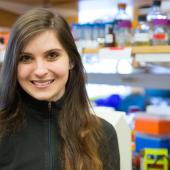
Ensuring the resilience and sustainability of the world's food supply is a major challenge, as the climate changes and the population grows. Increasingly, the approaches, tools, and know-how of industrial biotechnology are being applied to improve our food supply, both by making macronutrient ingredients (for example, proteins, fats, and cells) directly via fermentation and by making crop treatments via industrial biotechnology to improve agricultural food production. This session highlights the wide diversity of innovative agricultural-support and food ingredient products that have recently been or soon will be commercialized, to help feed the world more sustainably.
Read more about this session's speakers below and join us for this session on the second day of CIB 2023:
Focus Session - Agriculture & Food
1:00-1:30 PM: "Resilient Biomanufacturing with Precision Gas Fermentation"
Shannon Nangle, Co-founder and CEO, Circe
Circe is building a manufacturing platform that can generate any biomolecule from carbon dioxide, water, and electricity, starting with triglycerides. Triglycerides are fats, butters, and oils that are key components in foods, chemicals, & fuels. We reduce costs with our enhanced fermentation technology and provide high-quality tailored products with our sophisticated genetic engineering. At scale, we can compete with industrial agriculture and petrochemicals and decarbonize in the process.
1:30-2:00 PM: "Food for thought: making delicious, affordable animal-free cheese a market reality"
Binita Bhattchaterjee, Vice President of Process Development and Engineering, New Culture
New Culture is leading the global transition to an animal-free dairy future by making stretchy, melty cheese without any animal inputs. In other words: cow cheese without the cow! Our hero molecule, casein made from precision fermentation, enables us to replicate the taste and functional properties of conventional mozzarella without the ethical dilemmas, human health concerns and environmental impacts associated with industrial animal agriculture.
Earlier this year New Culture announced its first large-scale production of animal-free casein in preparation for the upcoming 2024 commercial launch at Nancy Siliverton’s iconic Pizzeria Mozza in Los Angeles. In this talk I will share our scale-up journey so far: what it has taken to produce recombinant casein that meets the exacting standards of an industry legend like Nancy, how we are continuing to drive down the cost of production to ensure our cheese will be accessible to everyone as we expand, and what remains to be done to achieve our global mission.
2:00-2:30 PM: "Scaling nitrogen fixation in maize to mitigate climate change"
Tamara Meragelman, Sr. Director of Research, Sound Agriculture
Twentieth century technologies (fertilizer, crop protection inputs, transgenic crops) have enabled massive productivity gains in food production, but have downsides to soil health, water quality and emissions. As biotechnology advances and our understanding of biology deepens, companies capable of harnessing this knowledge while understanding the evolving landscape of agricultural sustainability and market demands will lead the way in transforming agriculture.
At Sound Agriculture, we have the mission to create crop inputs and traits that lead to more sustainable, healthier and tastier food. For this, we established a biochemistry platform to design and develop molecules capable of controlling complex systems of interconnected biological networks. One successful example of the implementation of our platform is our flagship product, SOURCE. This product was designed to enhance plant nutrient use efficiency through selective signaling with specific beneficial soil microbes, including nitrogen fixers and phosphorus solubilizers. The foliar application of this product in the field provides a unique tool to growers, reducing the need for synthetic fertilizers, and mitigating the environmental impact while driving a resilient agriculture system.
2:30-3:00 PM: "Adoptability as the key to wide-spread adoption of alternatives to microbial alternatives to nitrogen fertilizers and pesticides"
Sarah Reiter, SVP – Business Development, BioConsortia Inc
Scientists and farmers have long understood the need to balance productivity and sustainability goals. Extensive growth in the use of biologicals – products based on microbes, botanicals, semiochemicals and other non-toxic solutions – reflects the increasing focus on farming with more beneficial environmental outcomes in mind.
This presentation will highlight the challenge to wide-spread adoption of biologicals presented by historical underperformance, lack of consistency and reduced usability. BioConsortia’s R&D platform designs superior microbial products to optimize our use of nitrogen fertilizer and replace nematodes. BioConsortia’s products overcome significant technical challenges in order to optimize farm adoption.


